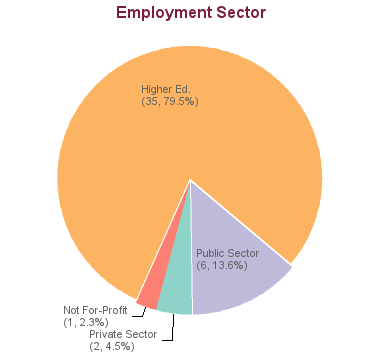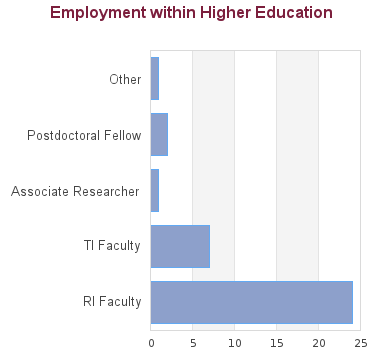Henrik Jacobsen
Doctor of Philosophy in Political Science (PhD)
Administering shared waters: Transborder governance in North America

Review details about the recently announced changes to study and work permits that apply to master’s and doctoral degree students. Read more
The Department of Political Science offers Master of Arts and Doctor of Philosophy degree programs that are structured around five substantive fields: Canadian politics, international relations, comparative politics, political theory, and U.S. Politics.
We offer in the range of 25 graduate seminar courses per year and ample support for mentoring grad students in their professional development, through research collaboration, workshops, and colloquia. We have the most successful doctoral graduates of any program in Canada, judged by our record of placing graduates in academic positions in Canada, the United States, Great Britain, Australia, and elsewhere.
One of the key criteria that sets the Political Science department at UBC apart is the methodological breadth and diversity of research interests of faculty members, using both quantitative and qualitative methods. We have particular strengths for graduate students in:
Quantitative Methods: we are particularly strong on quantitative methods for students using this kind of approach, with the deepest lineup of persons engaged in systematic quantitative research and the country’s most robust sequence of graduate methods courses for those students wishing to acquire a sophisticated understanding of quantitative analysis.
Regional Area Strengths: we are exceptionally strong in the study of Asian politics, the politics of the Americas, European politics, U.S. politics, and Canadian politics.
The online information session will cover information about our programs, course offerings, current faculty research, career outcomes, and admissions process.
The Faculty of Graduate and Postdoctoral Studies establishes the minimum admission requirements common to all applicants, usually a minimum overall average in the B+ range (76% at UBC). The graduate program that you are applying to may have additional requirements. Please review the specific requirements for applicants with credentials from institutions in:
Each program may set higher academic minimum requirements. Please review the program website carefully to understand the program requirements. Meeting the minimum requirements does not guarantee admission as it is a competitive process.
Applicants from a university outside Canada in which English is not the primary language of instruction must provide results of an English language proficiency examination as part of their application. Tests must have been taken within the last 24 months at the time of submission of your application.
Minimum requirements for the two most common English language proficiency tests to apply to this program are listed below:
Overall score requirement: 92
Reading
22
Writing
25
Speaking
23
Listening
22
Overall score requirement: 6.5
Reading
6.0
Writing
6.0
Speaking
6.0
Listening
6.0
Some programs require additional test scores such as the Graduate Record Examination (GRE) or the Graduate Management Test (GMAT). The requirements for this program are:
The GRE is required by some applicants. Please check the program website.
All applicants have to submit transcripts from all past post-secondary study. Document submission requirements depend on whether your institution of study is within Canada or outside of Canada.
A minimum of two references are required for application to graduate programs at UBC. Each graduate program determines the type of reference (e.g. academic, professional) and number of references they require which can range from 2 to 4. References should be requested from individuals who are prepared to provide a report on your qualifications for the program.
Many programs require a statement of interest, sometimes called a "statement of intent", "description of research interests" or something similar.
Students in research-based programs usually require a faculty member to function as their thesis supervisor. Please follow the instructions provided by each program whether applicants should contact faculty members.
Permanent Residents of Canada must provide a clear photocopy of both sides of the Permanent Resident card.
All applicants must complete an online application form and pay the application fee to be considered for admission to UBC.
Canadian Politics: federalism, the Canadian electoral system, the constitution, the courts, electoral reform, parliamentary institutions, political parties, Canadian public policy, Canadian political thought, voting behaviour Comparative Politics: democratization and democratic institutions, state-society relations, comparative public policy, comparative political economy, constitutional design and comparative political institutions, executive politics, separation of powers, governance, non-governmental organizations, and immigration politics International Relations: International Relations Theory, International Political Economy, International Security, International Law and Organization, International Norms, Human Security, the politics of international law, and global governance Political Theory: democratic theory, liberalism, constitutionalism, human rights, feminism, multiculturalism, nationalism, identity politics, critical theory, history of political thought.
| Fees | Canadian Citizen / Permanent Resident / Refugee / Diplomat | International |
|---|---|---|
| Application Fee | $116.25 | $168.25 |
| Tuition * | ||
| Installments per year | 3 | 3 |
| Tuition per installment | $1,875.34 | $3,294.66 |
| Tuition per year (plus annual increase, usually 2%-5%) | $5,626.02 | $9,883.98 |
| Int. Tuition Award (ITA) per year (if eligible) | $3,200.00 (-) | |
| Other Fees and Costs | ||
| Student Fees (yearly) | $1,144.10 (approx.) | |
| Costs of living | Estimate your costs of living with our interactive tool in order to start developing a financial plan for your graduate studies. | |
Applicants to UBC have access to a variety of funding options, including merit-based (i.e. based on your academic performance) and need-based (i.e. based on your financial situation) opportunities.
We offer a full five-year funding package for our PhD students, which generally consists of a combination of UBC Four-Year Fellowships (4YFs), Department Funding, Teaching Assistantship, and Research Assistantship.
In some cases, we are able to offer additional funding in the form of RA positions, but these are contingent on several factors, including faculty members having available research funds for RAs.
The Department of Political Science will offer TA opportunities to PhDs when available in order to enhance the financial resources at students’ disposal. Moreover, we consider it an important aspect of the professional development of our PhDs to work as Teaching Assistants, at some point in their PhD program, to develop their teaching skills under the guidance of faculty members.
This results in a net balance (any funding provided to the student minus tuition and fees) mean of $39,705 and median of $36,772.
All applicants are encouraged to review the awards listing to identify potential opportunities to fund their graduate education. The database lists merit-based scholarships and awards and allows for filtering by various criteria, such as domestic vs. international or degree level.
Many professors are able to provide Research Assistantships (GRA) from their research grants to support full-time graduate students studying under their supervision. The duties constitute part of the student's graduate degree requirements. A Graduate Research Assistantship is considered a form of fellowship for a period of graduate study and is therefore not covered by a collective agreement. Stipends vary widely, and are dependent on the field of study and the type of research grant from which the assistantship is being funded.
Graduate programs may have Teaching Assistantships available for registered full-time graduate students. Full teaching assistantships involve 12 hours work per week in preparation, lecturing, or laboratory instruction although many graduate programs offer partial TA appointments at less than 12 hours per week. Teaching assistantship rates are set by collective bargaining between the University and the Teaching Assistants' Union.
Academic Assistantships are employment opportunities to perform work that is relevant to the university or to an individual faculty member, but not to support the student’s graduate research and thesis. Wages are considered regular earnings and when paid monthly, include vacation pay.
Canadian and US applicants may qualify for governmental loans to finance their studies. Please review eligibility and types of loans.
All students may be able to access private sector or bank loans.
Many foreign governments provide support to their citizens in pursuing education abroad. International applicants should check the various governmental resources in their home country, such as the Department of Education, for available scholarships.
The possibility to pursue work to supplement income may depend on the demands the program has on students. It should be carefully weighed if work leads to prolonged program durations or whether work placements can be meaningfully embedded into a program.
International students enrolled as full-time students with a valid study permit can work on campus for unlimited hours and work off-campus for no more than 24 hours a week during academic sessions.
A good starting point to explore student jobs is the UBC Work Learn program or a Co-Op placement.
Students with taxable income in Canada may be able to claim federal or provincial tax credits.
Canadian residents with RRSP accounts may be able to use the Lifelong Learning Plan (LLP) which allows students to withdraw amounts from their registered retirement savings plan (RRSPs) to finance full-time training or education for themselves or their partner.
Please review Filing taxes in Canada on the student services website for more information.
Applicants have access to the cost estimator to develop a financial plan that takes into account various income sources and expenses.
47 students graduated between 2005 and 2013. Of these, career information was obtained for 44 alumni (based on research conducted between Feb-May 2016):


Our PhDs have been highly successful in pursuing academic and non-academic careers.
On the academic front, UBC PhDs hold tenured or tenure track positions at major universities in North America and internationally – including the University of Toronto, University of Victoria, University of Western Ontario, York University, University of Ottawa, University of Calgary, University of Pittsburgh, Georgia Tech, University of Essex, Sophia University, National University of Singapore, University of Sydney, University of Melbourne, Ritsumeikan University, University of Sheffield, Queensland University, Simon Fraser University, MacEwan University, University of Fraser Valley, University of Manitoba, Memorial University, McMaster University, and Cardiff University.
Our PhDs have held postdoctoral fellowships at a wide range of international institutions including Harvard University, Yale University, Columbia University, Vanderbilt University, University of Toronto, Queens University, Oxford University, Duke University, and others.
Many UBC PhDs have taken their doctoral training to high-level positions with government agencies, NGOs, and private-sector employers. Our students have pursued careers at Statistics Canada, the Supreme Court of Canada, the US Department of Defense Asia-Pacific Center, the International Committee of the Red Cross, Deutschebank (London), and the United Nations Commission on the Status of Women, among others.
These statistics show data for the Doctor of Philosophy in Political Science (PhD). Data are separated for each degree program combination. You may view data for other degree options in the respective program profile.
| 2023 | 2022 | 2021 | 2020 | 2019 | |
|---|---|---|---|---|---|
| Applications | 107 | 112 | 118 | 114 | 117 |
| Offers | 4 | 6 | 6 | 5 | 15 |
| New Enrolment | 4 | 6 | 6 | 4 | 8 |
| Total Enrolment | 41 | 43 | 45 | 48 | 51 |
Students in research-based programs usually require a faculty member to function as their thesis supervisor. Please follow the instructions provided by each program whether applicants should contact faculty members.
These videos contain some general advice from faculty across UBC on finding and reaching out to a supervisor. They are not program specific.
This list shows faculty members with full supervisory privileges who are affiliated with this program. It is not a comprehensive list of all potential supervisors as faculty from other programs or faculty members without full supervisory privileges can request approvals to supervise graduate students in this program.
The program covers the following subjects:
Departments/Programs may update graduate degree program details through the Faculty & Staff portal. To update contact details for application inquiries, please use this form.
